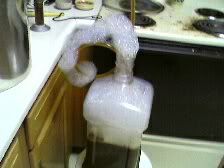Do you brush your teeth with your tap water? Do you shower with it and maybe get some in your mouth? Do you use ice made with the water coming into your house? Do you Drink it?
Do you live in a city that is currently having a boil water advisory?
Have we been so brainwashed from buying little plastic bottles of overpriced water (that may have ALSO come out of a tap, and MAY have less governement regulations than our municipal water) that we have forgotten that that sink in our kitchen isn't JUST used to wash dishes with? I have always found this fear that folks have of their own water ridiculous.
If you can drink your water you can brew with it (all arguments about chlorimines aside, I'm talking about sanitization.) If you can drink the water out of your tap without getting sick, you can top off your fermenter with it. I've done it all my brewing career and NEVER had any issues.
I've just found this blind trust people have over those tiny plastic bottles over our own home water is ludicrious....
Let's start with an independent four year study of the bottled water industry, completed in 1999 by the Natural Resources Defense Council.1 The report of the results along with a petition to the FDA stated that there were "major gaps in bottled water regulation and that bottled water is not necessarily safer than tap water". The study's principal findings were that although most bottled water seems good quality, "some bottled water contains bacterial contaminants, and several brands of bottled water contain synthetic organic chemicals (such as industrial solvents, chemicals from plastic, or trihalomethanes - the by-products of the chemical reaction between chlorine and organic matter in water) or inorganic contaminants (such as arsenic, a known carcinogen) in at least some bottles".
.........
This leads us to the subject of the chlorination of our public drinking water in the USA. This law is in effect to sterilize and disinfect the water, eradicating all types of bacteria.
According to the Natural Resources Defense Council (NRDC), which is a nonprofit organization devoted to protecting health and the environment, more than 25% of all bottled water comes from a public source. That's right - it's the same water that's piped to homes and businesses.
How can that happen? Because they can. No one is demanding truth in advertising from water bottling companies!
Standards for purity exist, of course. BUT ...Bottled water purity is regulated by the FDA, and because the FDA puts low priority on water, bottlers are inspected and tested less than once a year. According to one FDA official, it's the manufacturer's responsibility to ensure that the product complies with laws and regulations.
The result: Some do, and some don't. And even worse, if the water is bottled and delivered within the same state, there are NO regulations.
The Environmental Protection Agency (EPA) regulates tap water, so if a bottler uses a public source that has passed their inspection, it should be OK to drink - right? Not necessarily.
In tests done by the NRDC, at least one sample from a third of the brands contained bacterial or chemical contaminants, including carcinogens in levels exceeding state or industry standards. Not to be argumentative, but I have to wonder why any level of carcinogens is OK.
My understanding is that our municipal water sources are tested several times a day. That's how they are able to have a boil water declaration if something is detected.
Personally...I trust my tap water and my plumbing more than I think it's worth buying water, or bothering to boil it, if I don't have a BWA in my town.



